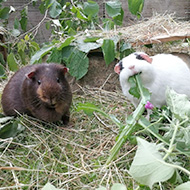Guinea pig welfare improving, vets say

"We're really proud of the positive difference that GPAW is making just two years after launching the campaign" - Dr Moyes.
A survey conducted by the organisers of Guinea Pig Awareness Week (GPAW) has revealed that 82 per cent of veterinary professionals believe that guinea pig welfare in the UK is improving.
GPAW, which took place for the second year running from 26 – 30 September 2022 is a campaign that highlights the welfare needs of guinea pigs, and veterinary professionals and owners alike are encouraged to get involved.
In 2022, the theme was 'Home Squeak Home', focusing on the importance of providing a safe and enriching environment.
Of the veterinary professionals surveyed, 93 per cent stated that GPAW has had a positive impact on guinea pig care in the UK.
Dr Suzanne Moyes, a veterinary surgeon involved with the organisation of GPAW, said: “Responsible pet ownership is really important to Burgess Pet Care and it is so encouraging that 93% of veterinary professionals believe that GPAW has had a positive impact on guinea pig care.
“It was also fantastic to learn that 100% of owners we surveyed believe that the campaign will have a positive impact on guinea pig welfare.”
The 2022 event saw initiatives to help owners create suitable indoor and outdoor housing, including how to adapt guinea pig housing for the changing seasons. Delivered via educational videos, live streams and Q and A sessions, GPAW 2022 was welcomed by the professions, with 38 per cent of veterinary professionals stating that housing was the most neglected welfare need among the species.
“There’s always more we can do to enable guinea pig owners to understand – and meet - the very specific welfare needs of these gorgeous, intelligent creatures, but we’re really proud of the positive difference that GPAW is making just two years after launching the campaign.”
Set to return in 2023, GPAW is supported by the RSPCA, Blue Cross and Woodgreen Pets Charity. Veterinary practices are encouraged to visit the GPAW website, where they can sign up to receive notifications about GPAW's next campaign.



 The Veterinary Medicines Directorate (VMD) is inviting applications from veterinary students to attend a one-week extramural studies (EMS) placement in July 2026.
The Veterinary Medicines Directorate (VMD) is inviting applications from veterinary students to attend a one-week extramural studies (EMS) placement in July 2026.